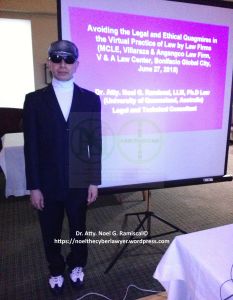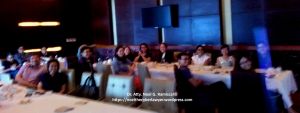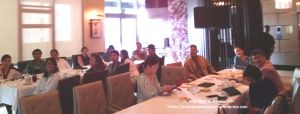Last July 14, 2015, Dr. Atty. Noel G. Ramiscal was given the opportunity to grace the Nobel Peace Conference Hall of the ICON Hotel in West Avenue, Quezon City, to share his views and research on some legal and ethical matters that confront lawyers who are trying to establish their practice on the Internet, with the lawyers of the Department of Environment and Natural Resources (DENR), Mines and Geo-Sciences Bureau, organized by the UP Institute of Administration of Justice.
In his Mandatory Continuing Legal Education (MCLE) lecture entitled “The Legal and Ethical Quandaries of Cyber Lawyers”, Dr. Ramiscal apprised the lawyers present of the current trends in software and mobile applications that have an impact in a practitioner’s choice of conducting online legal business. Since the DENR is a huge government agency with vast data (hard and electronic) resources, a pressing need for this agency would be the appropriate storage and retrieval of its electronic data.
Dr. Ramiscal confirmed that some of the lawyers know and already use some form of cloud computing services. He advised them that if this is going to be done on an agency basis, there must be an appropriate review and investigation of the Service Level Agreements (SLAs) proffered by cloud computing providers to the agency. He emphasized several areas that deserve scrutiny. The service provider’s “data retention and return policy” must be examined thoroughly and must meet the satisfaction of the agency, that in case of any security breach, or any legal issue that crops in connection with the e-data of the agency, the service provider must be able to return the custody and possession of the e-data to the agency. In line with this, the DENR should be able to know where the servers of the cloud computing provider are located. This is for the purpose of determining if there are possible conflicts of law in the states where those servers are located and with the Philippine laws.
A pressing matter in this regard, are the possible different laws and regulations on searches and seizures of electronic data, as well as the preservation and destruction of such e-data in the servers located in the different countries. Compounding the legal difficulty is the need to scrutinize the agreements between the cloud computing provider and third parties (e.g., the owners of the servers) that are pertinent to the safekeeping, custody and preservation of the agency’s e-data. Dr. Ramiscal emphasized that signing SLAs with cloud computing providers is not a simple legal and ethical matter, where the agency’s e-data is concerned. Lawyers must strive to competently give their agency the necessary legal advice when faced with the technical and legal realities of cloud computing.Dr. Ramiscal also dealt with issues that are relevant to the individual practice of lawyers, outside of their responsibilities to their agency. Government lawyers are given limited right to practice their profession. In some cases, the only way to serve some clients is to “unbundle” the legal services. “Unbundling” is the mode of performing certain specific legal services for a client, on a matter that does not require the full representation of a lawyer. It could be the preparation of documents or certain applications that need legal assistance, but beyond that, the client is empowered (with advice from the attorney) to do the necessary succeeding acts. Of course, this is laden with ethical obligations that lawyers must comply to safeguard the interests of their clients.
Other concerns raised by the utilization of computer technology, internet innovations and social media for the work place and personal use were discussed by Dr. Ramiscal for the benefit of the DENR lawyers.
He also apprised them of the latest trends in computer analytics that are now impacting the discovery of electronic evidence. These were made possible by the great strides made in the development of artificial intelligence, including IBM’s Watson, which pointed the way to the future of computer assisted reviews.Dr. Ramiscal would like to thank the lawyers present who truly and graciously gave him their time of day and to the UP IAJ of course.
Delivering this lecture at the Nobel Peace Hall, at an “Icon”ic hotel, with a room of attentive and gorgeous lawyers, made Dr. Ramiscal feel as if he had won something!































